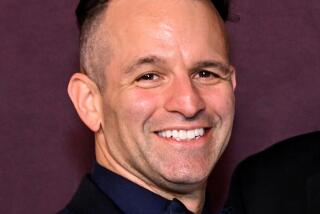Weinstein Co. sale approved by bankruptcy court
The planned sale of the studio co-founded by film impresario Harvey Weinstein won Bankruptcy Court approval Tuesday, a key milestone for the troubled company seven months after its former leader was accused of sexual harassment and assault.
At a crowded hearing in Wilmington, Del., Judge Mary F. Walrath said she would approve the sale of the Weinstein Co.’s assets to Dallas-based private equity firm Lantern Capital Partners, which offered $310 million in cash and will assume about $115 million in liabilities related to film and television projects.
Lantern, best known for holdings including a zinc recycling firm and a bulk shipping operation, won the assets by default last week when Weinstein Co.’s planned bankruptcy auction attracted no serious competitive bids by the April 30 deadline. As a Hollywood outsider focused on distressed assets, Lantern now faces the daunting task of turning the remains of the once high-rolling studio into a new and thriving film company.
But after the company’s auction process, it became clear that the Lantern bid was the only way for Weinstein Co.’s assets to have a future, lawyers said.
“The Lantern deal represents full and fair value for the company,” said Paul Zumbro, an attorney at Cravath, Swaine & Moore LLP who is representing Weinstein Co. in the sale.
Weinstein Co. filed for Chapter 11 protection from creditors March 19 with less than $500,000 in cash, having failed to find a buyer that would spare the studio from bankruptcy after the dozens of accusations against Weinstein. The fallout pushed the company into a free fall and touched off the #MeToo movement against sexual harassment and assault.
The company was hobbled by multiple lawsuits, including an ongoing case brought by the New York attorney general’s office in February. In a twist, New York Atty. Gen. Eric Schneiderman announced his resignation Monday after four women accused him of physical abuse in an article published by the New Yorker. He has strongly disputed the allegations. The office’s cases will continue, acting Atty. Gen. Barbara Underwood said in a Tuesday statement.
Weinstein, who has denied all allegations of non-consensual sex, was fired from his namesake company Oct. 8.
A previous plan to sell the studio to former Obama administration official Maria Contreras-Sweet and billionaire Ron Burkle for $500 million collapsed after the buyers said they discovered millions of dollars in undisclosed liabilities. Lantern had been a minority backer of that bid, which promised to remake the company as a female-friendly show business enterprise and establish a victims fund.
Lantern then stepped in with its so-called stalking-horse offer, which was supposed to set a floor for an auction. But expected competitive bids from companies including Lionsgate and Miramax never materialized, and the auction was canceled, leaving Lantern as the winner.
In an email to Weinstein Co. employees obtained by The Times, Lantern Chief Executive Andy Mitchell and partner Milos Brajovic promised to transform Weinstein Co. into a force for good in entertainment.
“Our new company will represent an unwavering commitment to a culture of diverse professionals with the absolute highest level of ethics and standards,” wrote Lantern’s leaders. “Our investment is in people. The best people will position us as the most progressive and forward-thinking presence in the industry.”
The Lantern deal secured the judge’s approval, despite a late bid from hedge-funder-turned-Broadway producer Howard Kagan, who promised to create a $30-million settlement fund for Weinstein’s accusers and create a new progressive media company. However, that proposal was deemed too little, too late.
Kagan and his company, Inclusion Media, submitted an expression of interest on May 1, one day after the bidding deadline expired. According to court documents, Inclusion Media initially offered $315 million for the Weinstein Co. and later increased its bid to nearly $325 million.
Weinstein Co. lawyers said Inclusion Media had never submitted a formal bid for the assets that would top Lantern’s deal. Inclusion Media also failed to prove that it had the financing needed to complete the deal, the lawyers said.
The late bid from Kagan caused last-minute legal tensions in the lead-up to Tuesday’s hearing. Last week, lawyers representing the plaintiffs in a class-action lawsuit against Harvey Weinstein and Weintein Co. voiced their support for Kagan’s bid, calling the Lantern arrangement a “raw deal for victims.” Lantern’s bid does not promise a designated fund to help compensate victims.
A group of unsecured creditors recently filed an objection to the Lantern purchase, saying it was “mystifying how the Debtors could have determined that the sale to Lantern was better than the alternatives.”
However, the Inclusion Media bid received little attention in the hearing. Weinstein Co. lawyers noted that three declarations had been filed in support of the sale, including one from Weinstein Co.’s chief restructuring officer. Judge Walrath agreed with Weinstein Co.’s determination that the Lantern bid was the best offer on the table.
“I am happy to approve the sale,” Walrath said at the hearing.
The company has also received objections from a long list of celebrities, including Heidi Klum, Brad Pitt and Jay Z, who say the studio owes them money. Those claims are to be handled at another hearing set for May 22.
UPDATES:
3:52 p.m.:This article was updated to include a quote from Lantern Capital Partners.
This article was originally published at 1:25 p.m.
More to Read
Inside the business of entertainment
The Wide Shot brings you news, analysis and insights on everything from streaming wars to production — and what it all means for the future.
You may occasionally receive promotional content from the Los Angeles Times.







